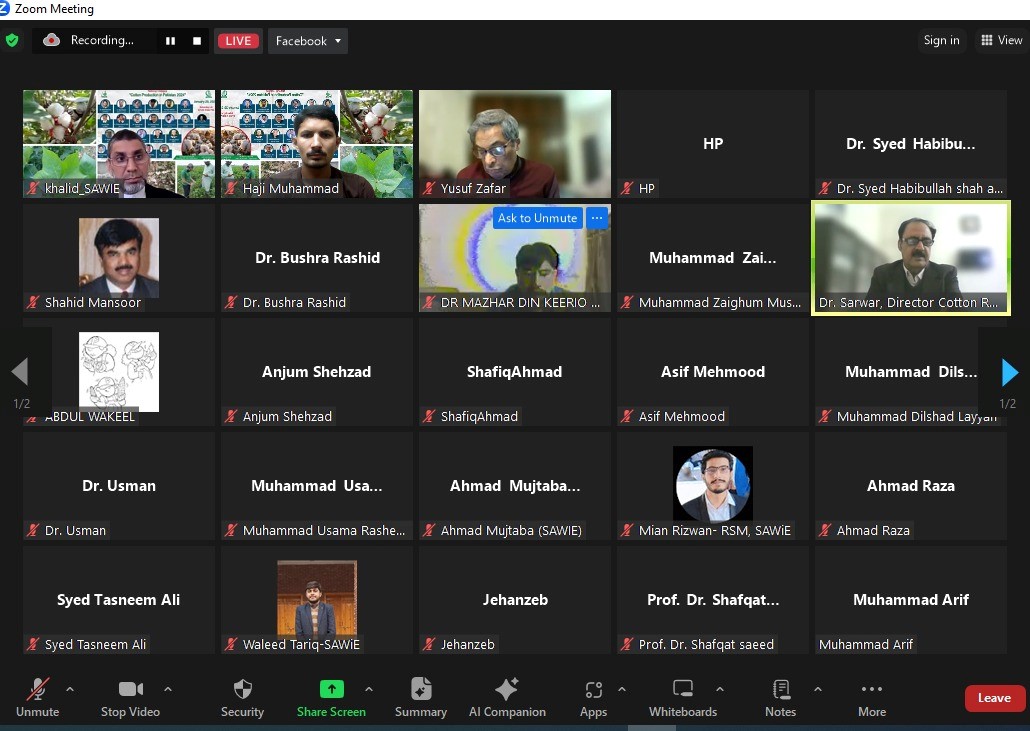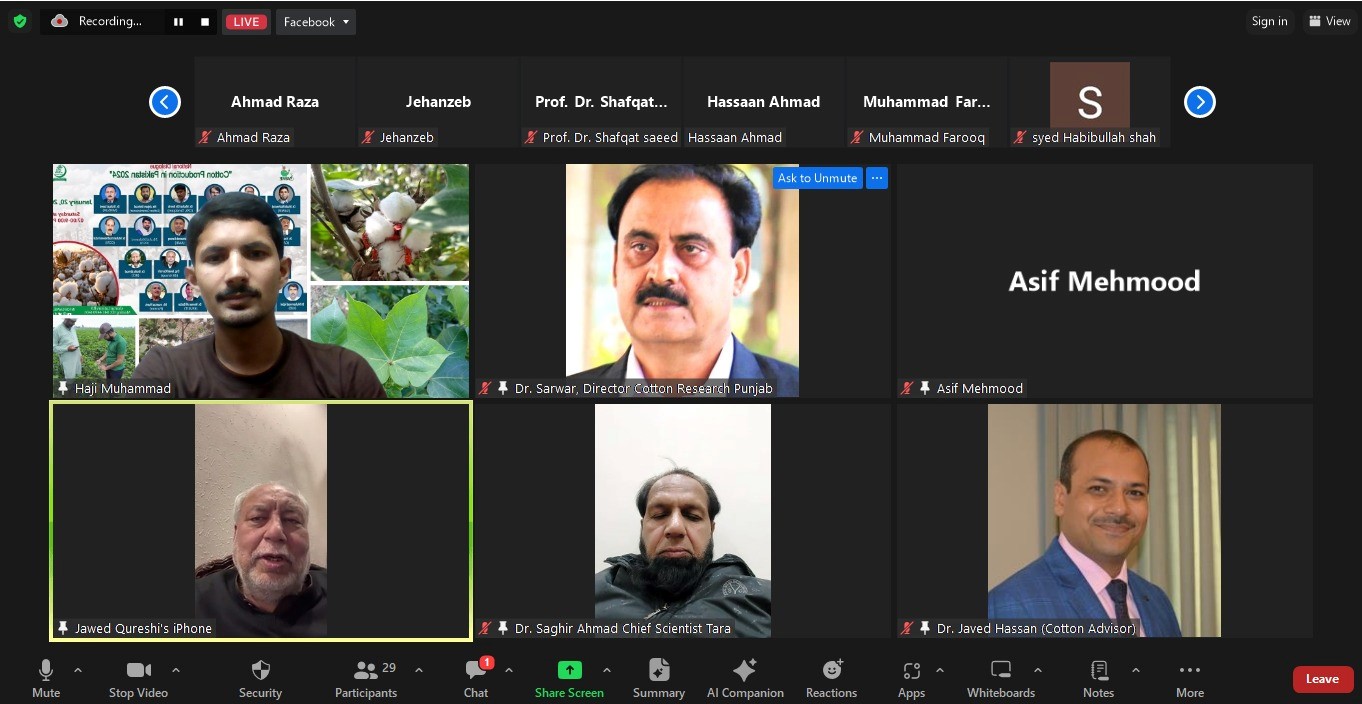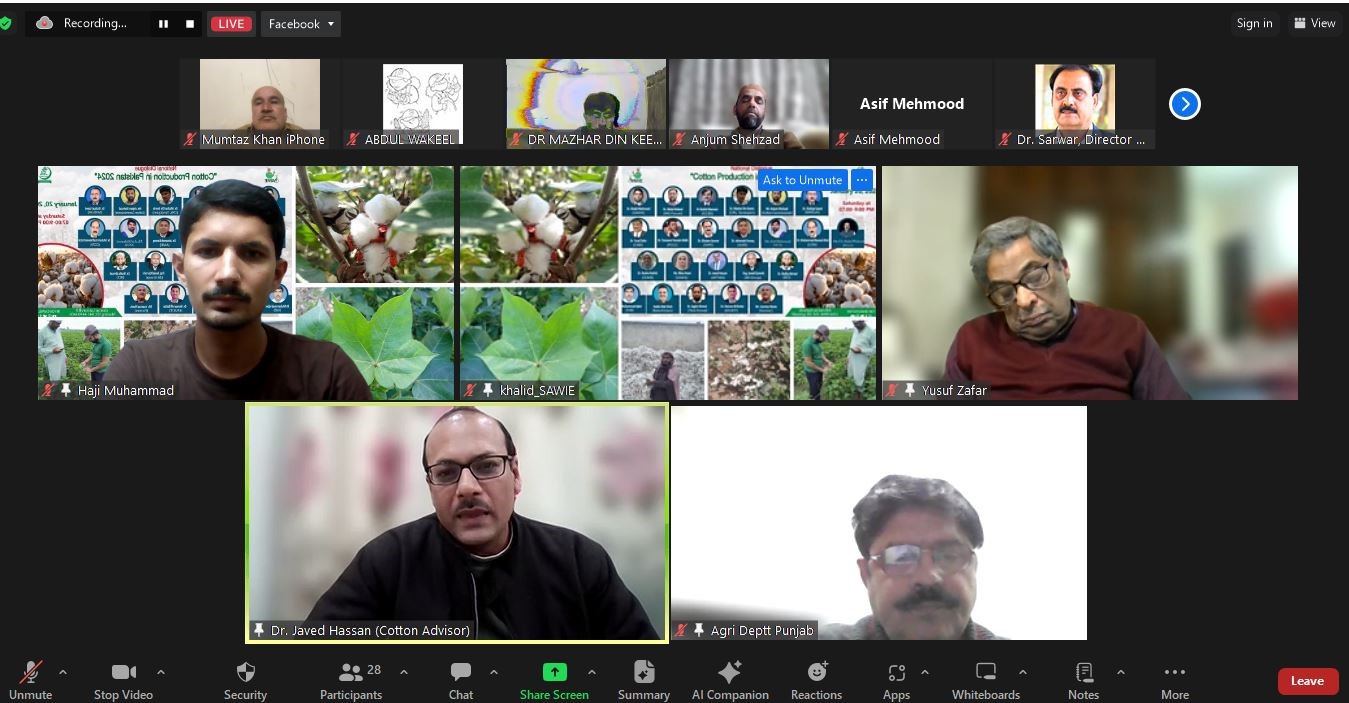Cotton is an important crop for Pakistan generating $22 Billion as an export income, in recent years its production has suffered a huge setback from climate change. For the first time in the last 10 years, its production has reviewed to about 8.3 million bales which was declined to less than 4 million bales. It is a moment of great success for the entire country, congratulations to our cotton farmers, and stakeholders including provincial and federal govt. SAWIE in collaboration with the Pakistan Agricultural Scientists (PAS) Forum, organized a national dialogue on “Cotton production of Pakistan in 2024” on January 20, 2024. This online event brought together diverse participants, including representatives from research institutes, universities, government officials, private companies, students, and, notably, farmers—the backbone of Pakistan’s textile industry.
The comprehensive dialogue, spanning various facets of cotton production, aimed to address challenges the cotton crop is facing in the field. It covered topics from govt policies, cotton crop production, low yield, threats from pests and diseases, market trends, competition, need for adopting innovative solutions. All the stakeholders from farming, inputs supply companies, ginners, and textile millers came together to formulate a strategic vision for the cotton industry for 2024.
Distinguished speakers from various fields shared their insights. Dr. Yusuf Zafar from the Center of Agriculture and Biosciences International (CABI) provided a retrospective analysis of cotton production in 2023, offering valuable perspectives for the future. There is an immediate need to develop a vertical linkage among the supply chains to improve the quality and traceability of our white gold. Dr. Syed Habib Ullah Shah from Baluchistan Agriculture Extension Department shared the great potential for cultivating organic cotton in Baluchistan, offering a glimpse into the growing interest in sustainable and eco-friendly farming practices. The province’s production has jumped to more than 1 Lakh acres in the last three years. Dr. Mazhar Din Keerio, Director of Cotton Research Institute, Tando Jam, shared provincial plans to expand the cotton area to about 675,000 acres in Sindh,
Integrating climate-smart technologies using digital solutions based on Machine Learning and AI and satellites will be an important area to consider for protecting our cotton crop from the adverse effects of climate change. Dr. Bushra Rashid, Director of CEMB, Punjab University advocated for the deployment of smart agricultural solutions besides the new breeding material of cotton. Dr Ghulam Sarwar, Director of Punjab Cotton Research Institute, said, we need to improve soil health to get better yield per acre.
Eng. Javed Qureshi, chairman of 4B, said Pakistan must keep a balance between food and fiber crops. We are growing wheat on more than 22 million acres. The average yield is less than 39 months. We need to improve our wheat varieties as there is a huge genetic potential to improve to produce more grain per acre. This will help to reduce its area under cultivation and spare a few million acres of land to grow oilseed crops followed by cotton crops through early sowing in February-March instead of May-June. Pakistan is investing $4 billion in oilseed imports. These extra two months will help to produce cotton with less pest pressure and increase yield by another 20 Monds leading to harvesting about 40 monds per acre compared to 20 monds.
Dr Abdul Wakeel emphasized the need for using balanced fertilizer in cotton, we should encourage farmers to apply phosphorus and trace elements of Born to get a better crop that is resistant to pests.
The leading experts from various sectors of the cotton industry including Dr. Javed Hassan from the All-Pakistan Textile Mills Association (APTMA), Dr Shafique Ahmed from Better Cotton Initiative (BCI), Mr. Asif Mehmood from the Organic Cotton Accelerator (OCA), and Ch Waheed, chairman of the Pakistan Cotton Ginners Association (PCGA), shared their insights on challenges ranging from production, storage, quality, marketing to sustainability practices and outlined ambitious goals for 2024, emphasizing collaboration between the public and private sectors.
In concluding remarks, Cotton Commissioner Dr. Anjum Shehzad, emphasized the need to shift from conventional farming to modern tools, aligning with global agricultural trends.
The event proved to be a catalyst for knowledge exchange and capacity-building for farmers. Improving fiber length and reducing trash in cotton is important to improve cotton quality. It is important to introduce a premium-based mechanism to reward the quality of the cotton. This will enable a roadmap to achieve sustainable and traceable cotton production in Pakistan with its quality Made in Pakistan Cotton Brand.
SAWIE expressed its commitment to continuing efforts in farmer capacity-building, facilitating farmer-friendly policymaking, and contributing to the overall betterment of Pakistan’s economy. SAWIE is working with the provincial governments to promote cotton production. SAWIE has signed an MOU with the Baluchistan Agriculture Extension Department to work together to promote Organic cotton production in the province. The national dialogue served as a platform for collaboration, innovation, and a shared commitment to the prosperity of Pakistan’s cotton industry in 2024 and beyond.



